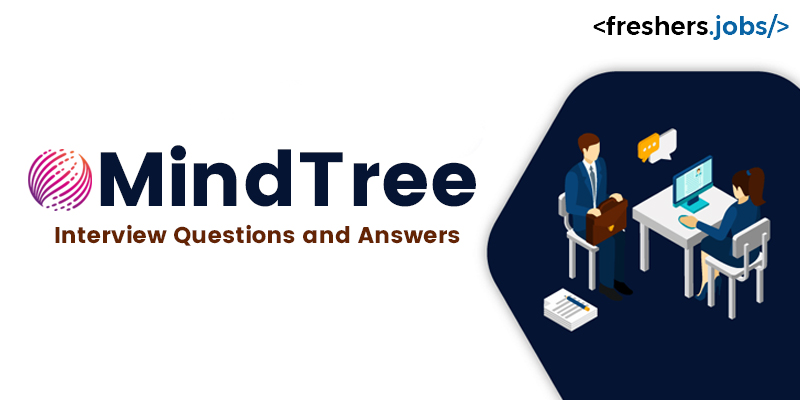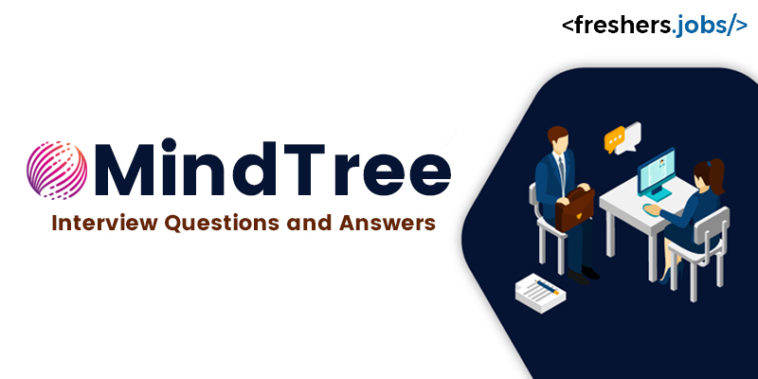MindTree is an Indian multinational Information Technology (IT) and outsourcing corporation. As of March 31, 2019, the company boasts an impressive presence with over 307 active clients and a network of 43 offices spanning across 18 countries. Its expertise lies in a wide range of areas, including e-commerce, mobile app development, cloud computing, digital transformation, data analytics, quality assurance, enterprise application integration, and enterprise resource planning.

The company operates within four distinct industry verticals, which are Retail CPG and Manufacturing, Banking, Financial Services and Insurance, Technology Media and Services, and Travel and Hospitality. These verticals help the company address various consumer challenges effectively. Mindtree promotes its robust capabilities and forward-thinking approach to address consumer needs and provide solutions in these domains. In this blog, we are going to discuss the mindtree interview questions and the interview process.
Interview Process
The MindTree recruitment process typically comprises three distinct evaluation phases. These 3 stages involve the assessment of a candidate’s technical expertise and analytical skills, and they are as follows:
- Online Assessment
- Technical Interviews
- HR Interviews
It’s important to note that each round is designed as an elimination round. To be eligible for a position at MindTree, successful progression through all the rounds mentioned above is required.
If you are in search of job openings in Coimbatore, you can look for job openings available in that city. Visit fresher job openings in Coimbatore to find job positions that are relevant to your skills and abilities.
Interview Rounds
Online Assessment: In the typical online assessment round at mindtree interview process, there are typically four distinct sections. These sections include:
- Written English Proficiency: This session evaluates the candidate’s proficiency in English writing. Questions in this session typically involve tasks such as completing sentences with the appropriate tense, selecting the correct preposition, identifying synonyms and antonyms, and more. Additionally, it may also involve questions related to a provided passage, requiring responses to 3 to 4 questions based on that passage. If you possess strong English writing skills, this section should pose no challenge.
- Quantitative Proficiency: This session evaluates the candidate’s quantitative and mathematical aptitude. Questions in this section primarily revolve around mathematical concepts. It’s crucial to exhibit both speed and accuracy when tackling this section. Ensure meticulousness to avoid making careless errors and thoroughly analyze each question.
- Logical Reasoning: This session in mindtree interview process assesses the candidate’s logical thinking abilities. Questions in this session generally involve identifying the next term in a series, recognizing patterns, identifying the outlier, and similar tasks. Strive for a high level of accuracy by solving as many questions correctly as possible in this section.
- Coding Problems: This session typically includes two coding problems ranging from easy to medium difficulty levels. Your goal should be to successfully pass all the test cases for both problems. You’ll have the flexibility to write code in any of the modern programming languages, including C, C++, Java, Python, and more. To excel in this section, it’s essential to have a solid base in data structures and algorithms.
Technical Interview: Candidates who successfully pass the online test will receive an invitation for an in-person technical interview. These interviews are assigned to assess your technical competencies, which are often conducted for the specific role you’re applying for, as well as to evaluate your problem-solving skills, thought processes, and ability to handle challenging scenarios. Interviewers will also gauge your problem-solving abilities. To answer these mindtree technical interview questions, it’s important to have a strong foundation in computer science to prepare adequately. Proficiency in at least one of the latest programming languages, like C, C++, Java, or Python, is essential. Additionally, you may be queried on computer science fundamentals like Object-Oriented Programming Systems, DataBase Management Systems, Computer Networks, Computer Organization and Architecture, and Operating Systems, among others. The number of technical interviews you undergo depends on the candidate’s performance in previous rounds, the specific job opportunity and the organization’s requirements. Typically, candidates go through just one round of technical interviews.
HR Interview: The HR interview, which follows the technical interviews, is a very important stage in the assessment process at MindTree. The company places significant emphasis on evaluating whether you align with its organizational culture. Therefore, it’s essential to thoroughly familiarize yourself with MindTree’s vision and leadership principles before your HR interview. Preparing your responses to align with these values is a vital aspect of acing the HR Interview in the mindtree interview process. It’s advisable to take the time to review your resume thoroughly, ensuring that all the information you’ve provided is accurate and can be substantiated. This preparation will help you respond effectively to any questions the interviewer may pose based on your resume content.
MindTree offers a wide range of job vacancies for freshers. Interested Candidates can click on MindTree Jobs For Freshers to apply for various job roles relevant to their skills and abilities.
Now, let’s see some frequently asked interview questions in the HR interview.
- Could you provide a brief introduction of yourself?
As a fresher candidate, you can provide a concise response to the “Tell me about yourself” question by focusing on relevant aspects such as your education, key skills, and career aspirations, like,
I recently graduated with a [Your Degree] in [Your Major] from [Your University]. During my academic journey, I developed a strong foundation in [Highlight a Relevant Skill or Area of Study], and I’m excited about applying this knowledge in a professional setting. I’m a quick learner, detail-oriented, and eager to contribute to a dynamic team. My goal is to continuously grow and evolve in my career, and I’m excited about the opportunity to do so with [Company Name].
- What initially attracted you to consider joining MindTree?
As a freshers jobs seeking candidate, you can provide an answer to these types of mindtree interview questions by highlighting what specific aspects of MindTree’s reputation, values, or opportunities appeal to you, like,
What initially attracted me to consider joining MindTree is the company’s strong commitment to innovation and its reputation for nurturing and developing young talent. I’ve been impressed by MindTree’s diverse and inclusive work culture, which I believe provides an ideal environment for learning and growth. Additionally, the opportunity to work on cutting-edge projects in the field of [mention a relevant field or technology] aligns perfectly with my career aspirations. I’m excited about the potential to contribute to MindTree’s success and further develop my skills and knowledge in this dynamic industry.
- Where would you like to see yourself five years from now?
You can respond to this question by expressing your aspirations and how you hope to grow in your career, like,
In five years, I would like to see myself as a highly skilled professional in [mention your field or industry], having gained substantial experience and expertise. I hope to have made significant contributions to my team and the projects I work on, and I’m eager to take on more responsibilities. Additionally, I aim to continue learning and keeping up with the latest developments in the industry. Ultimately, I see myself as a valuable asset to a forward-thinking organization like [mention the Company Name], contributing to its success and growth.
- Could you provide some details about your internships and the projects you’ve been involved in?
Certainly, you can respond to these kinds of mindtree interview questions by briefly summarizing your internship experiences and the projects you’ve worked on, like,
I’ve had the opportunity to complete internships during my academic journey. One of my notable internships was at [Company Name], where I was part of a team working on [briefly describe the project]. I played a role in [mention your specific contributions], which allowed me to apply my knowledge and learn new skills. Additionally, I worked on academic projects such as [mention a relevant project], where I [briefly describe your role and achievements]. These experiences have improved my problem-solving abilities, teamwork, and technical skills, preparing me for a successful start in my professional career.
Technical Interview Questions
Now, let’s delve into some frequently asked mindtree technical interview questions. The following are some of the frequently asked Technical questions.
Please provide an explanation of the HTTP and HTTPS protocols within the context of computer networks.
- HTTP: HTTP stands for Hypertext Transfer Protocol serves as a set of guidelines and standards governing the transmission of data over the internet. It defines the communication protocols between web browsers and servers. Operating at the application layer and utilizing TCP as its underlying transport protocol, HTTP utilizes hypertext to establish logical connections between text-based nodes. It is often referred to as a “stateless protocol” because each command is independently executed without relying on previous commands as references.
- HTTPS: The full form of HTTPS is HyperText Transfer Protocol Secure, representing an enhanced and secure iteration of HTTP. It operates on port 443 for data transmission and ensures security through comprehensive encryption using SSL. Essentially, it combines elements of both the SSL/TLS and HTTP protocols. HTTPS serves the crucial role of securely identifying network servers while facilitating a safe, encrypted connection between the server and the browser. This two-way data security feature helps thwart potential theft of sensitive information.
What is the difference between Multiprogramming and Multitasking?
- Multiprogramming: Multiprogramming serves as a strategy aimed at optimizing CPU utilization by organizing applications in a way that ensures only one program runs at any specific moment. This approach relies on the concept of context switching, a routine operation that enables a CPU in a single-processor system to transition between different tasks seamlessly. To facilitate this transition, the Process Control Block (PCB) is employed, serving as a record of the active process’s status, thus allowing the CPU to continue execution from the exact point where it left off.
- Multitasking: Multitasking aims to enhance response times by distributing computing resources among numerous users. Multitasking operates on the principle of time-sharing, where each task or process is allocated an equal amount of time for execution.
Could you provide the benefits of Object-Oriented Programming (OPP)?
Here are the benefits of Object-Oriented Programming (OOP):
- Instead of creating code entirely from the beginning, we can construct applications by assembling reusable modules that interact with each other. This not only saves time but also enhances productivity.
- Object-oriented programming enables us to break down complex programs into smaller, more manageable problems that can be tackled individually, simplifying the development process.
- Object-oriented programming languages enhance programmer effectiveness, elevate software quality, and lower maintenance expenses.
In conclusion, preparing for a MindTree interview requires a combination of technical knowledge, an understanding of the company’s culture and values, and effective communication skills. We’ve explored some common mindtree interview questions and provided answers to help you get started. Remember that every interview is unique, and it’s essential to prepare your responses according to your own skills and strengths.



